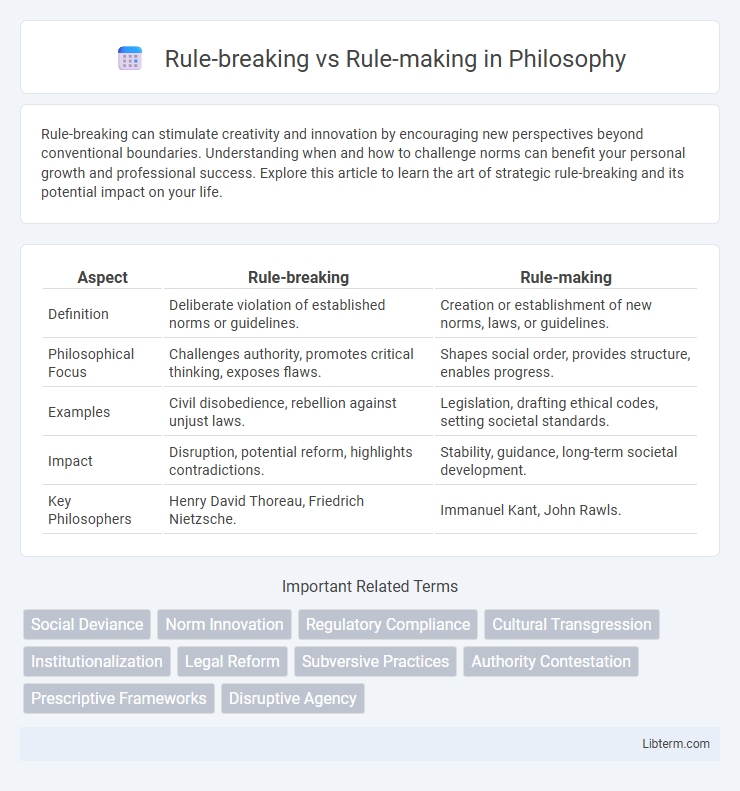Rule-breaking can stimulate creativity and innovation by encouraging new perspectives beyond conventional boundaries. Understanding when and how to challenge norms can benefit your personal growth and professional success. Explore this article to learn the art of strategic rule-breaking and its potential impact on your life.
Table of Comparison
| Aspect | Rule-breaking | Rule-making |
|---|---|---|
| Definition | Deliberate violation of established norms or guidelines. | Creation or establishment of new norms, laws, or guidelines. |
| Philosophical Focus | Challenges authority, promotes critical thinking, exposes flaws. | Shapes social order, provides structure, enables progress. |
| Examples | Civil disobedience, rebellion against unjust laws. | Legislation, drafting ethical codes, setting societal standards. |
| Impact | Disruption, potential reform, highlights contradictions. | Stability, guidance, long-term societal development. |
| Key Philosophers | Henry David Thoreau, Friedrich Nietzsche. | Immanuel Kant, John Rawls. |
Understanding Rule-Breaking and Rule-Making
Rule-breaking involves the conscious decision to violate established norms or regulations, often challenging existing systems to create awareness or prompt change. Rule-making entails the formulation and establishment of guidelines or laws designed to regulate behavior and maintain order within a society or organization. Understanding the dynamics between rule-breaking and rule-making is essential for analyzing social evolution, as rule-breaking can inspire new rule-making processes that reflect shifting values and needs.
The Psychology Behind Rule-Breaking
The psychology behind rule-breaking reveals motivations such as the pursuit of autonomy, resistance to perceived control, and the desire for social recognition. Neuropsychological studies show that dopamine release during risky behaviors reinforces rule-breaking actions, making them more appealing. Understanding these intrinsic psychological drivers helps in designing effective policies and interventions that balance enforcement with psychological needs.
The Role of Rule-Makers in Society
Rule-makers establish frameworks that guide societal behavior, ensuring stability and order within communities. Their decisions shape legal and ethical standards, influencing social norms and public policies that affect daily life. By balancing authority and flexibility, rule-makers foster environments that support justice, innovation, and collective well-being.
Historical Impact of Rule-Breakers
Rule-breaking throughout history has often acted as a catalyst for societal transformation, challenging unjust or outdated laws and inspiring reform movements. Visionaries like Martin Luther King Jr. and Rosa Parks defied segregation laws, accelerating the civil rights movement and reshaping legal standards worldwide. These acts of defiance highlight the critical role of rule-breakers in driving progress by exposing systemic flaws and prompting the creation of more equitable regulations.
The Benefits of Rule-Making for Social Order
Rule-making establishes clear guidelines that promote consistency and predictability, essential for maintaining social order. By creating structured laws and regulations, societies can reduce conflicts and ensure fairness in the treatment of individuals. Effective rule-making fosters trust and cooperation among community members, contributing to stability and collective well-being.
When Rule-Breaking Drives Innovation
Rule-breaking drives innovation by challenging established norms and fostering creative problem-solving that rigid rule-making may stifle. In industries like technology and design, disruptive breakthroughs often emerge when individuals or companies deliberately defy conventional guidelines to explore uncharted possibilities. This dynamic tension between rule-breaking and rule-making catalyzes progress by balancing creative freedom with structured frameworks.
The Risks and Consequences of Rule-Breaking
Rule-breaking poses significant risks including legal penalties, loss of reputation, and social ostracism, which can undermine personal and professional opportunities. Consequences often extend beyond individuals to disrupt organizational integrity and societal order, leading to diminished trust and increased enforcement costs. Persistent rule-breaking may escalate conflicts and foster environments prone to unethical behavior and instability.
Ethical Dilemmas: Making vs. Breaking Rules
Ethical dilemmas in rule-making versus rule-breaking often arise when individuals must choose between adhering to established norms and challenging them to address injustices. Rule-making involves creating guidelines that balance fairness and societal values, while rule-breaking can highlight when rules become obsolete or unethical. Navigating these dilemmas requires critical judgment to assess whether maintaining rules supports morality or if breaking them fosters ethical progress.
Case Studies: Rule-Makers vs. Rule-Breakers
Case studies comparing rule-makers and rule-breakers reveal how individuals or groups shaping regulations often maintain power by legitimizing rules, while rule-breakers challenge established norms to drive innovation or social change. For example, civil rights activists like Martin Luther King Jr. broke segregation laws to highlight injustices, prompting new legislation. Corporate leaders such as Steve Jobs, acting as rule-makers, redefined technology markets by setting new standards for product design and user experience.
Striking the Balance: Navigating Rules in a Changing World
Striking the balance between rule-breaking and rule-making is essential in a rapidly evolving world where innovation and stability must coexist. Effective governance requires adapting existing regulations while encouraging constructive rule-breaking to foster creativity and social progress. Navigating this dynamic landscape demands continuous evaluation of when to uphold traditions and when to embrace transformative changes for sustainable development.
Rule-breaking Infographic

 libterm.com
libterm.com